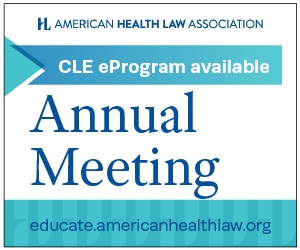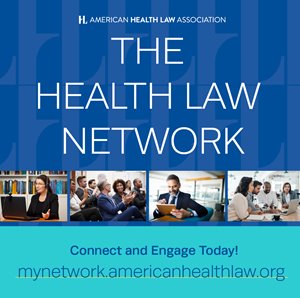Cookie Consent
This site uses cookies to store information on your computer. Without consent certain enhanced features will not be available and future visits may require repeated consent, so it is recommended to accept the use of cookies. Visit the AHLA Privacy Policy for more information.
Wednesday, June 28
Government Representatives Discuss Just-Issued Information Blocking Final Rule
Minutes after the Department of Health and Human Services Office of Inspector General (OIG) issued its long-awaited final rule on information blocking, OIG representatives gave attendees of AHLA’s 8AM session the first scoop on the rule.
The session had four government speakers: Elise Sweeney Anthony, Executive Director, Office of Policy, Office of the National Coordinator for Health IT (ONC); Cassie R. Weaver, Policy Analyst, Office of Policy, ONC; James F. Hansen, Senior Counsel, Affirmative Litigation Branch, OIG; and Scott P. Stiefel, Senior Counsel, Affirmative Litigation Branch, OIG.
The final rule implementing new authorities under the 21st Century Cures Act for investigating claims and imposing civil money penalties (CMPs) for information blocking applies only to health IT developers of certified health IT, health information networks, and health information exchanges.
Noting that OIG will likely get many more complaints than it can investigate, the OIG speakers said the rule lays out the agency’s enforcement priorities including conduct that resulted in, is causing, or has the potential to cause, patient harm; impacted a provider's ability to care for patients; was of long duration; caused financial loss to federal health care programs or other government or private entities; or was performed with actual knowledge.
Hansen noted that every allegation will be reviewed for specific facts and circumstances and that the priorities are not dispositive. He also highlighted for the audience that enforcement will begin 60 days after the publication of the final rule and conduct occurring before the effective date will not be subject to CMPs.
Stiefel gave the audience several illustrative violation examples to show how the final rule would work in practice. He also explained how OIG will determine the amount of CMPs under the rule. Stiefel noted that such factors as: the nature and circumstances of the violation; the degree of culpability; whether the conduct was self-disclosed; history of prior offenses; the nature and circumstances of the information blocking including the number of patients affected, the number of providers affected, and the number of days the information blocking persisted; and the harm resulting from the information blocking, including the number of patients affected, the number of providers affected, and the number of days the information blocking persisted will be taken into account but factors will not be double counted. According to Stiefel, the government will make a holistic determination of a reasonable CMP.
The OIG speakers also noted that OIG will not be issuing advisory opinions on information blocking; instead, ONC is working on gaining legislative authority to issue advisory opinions.
During a question and answer session, OIG speakers acknowledged that, although the final rule does not apply to providers, a health care system could potentially meet the functional definition of a developer and should be aware of the rule’s requirements.
Navigating Value-Based and Risk Arrangements in a Post Regulatory Sprint World
Catherine A. Martin (Luminis Health), Danielle M. Sloane (Bass Berry & Sims PLC), and Jillian A. Sparks (Office of Inspector General, US Department of Health and Human Services)
The speakers shared a number of important issues and considerations that health lawyers and other health law professionals should keep in mind as they advise clients, including:
- Although value-based health care is still in its infancy, it is gaining momentum. There are a number of companies that are aiming to partner with practices and hospitals to leverage technology, facilitate clinical care redesign and take risk. There is also a lot of opportunity under the Regulatory Sprint rules for the industry to wade into value-based care.
- Most of the value-based activities outside of CMMI programs or MSSP seems to be in the Medicare Advantage and managed Medicaid space.
- Once a practice is at risk for a patient population, patient engagement and incentives become important to improving quality and reducing costs. It is important to design those reward and incentive programs with the applicable fraud and abuse and related guidance in mind.
- While there is significantly more flexibility under the fraud and abuse laws to evolve into value-based care, there are still some practical and regulatory challenges to shifting to value-based care.
How Dobbs Impacts the Provision of Emergency Care
AHLA speakers Louise M. Joy, Joy & Young LLP; Ramona Thomas, General Counsel, VP of Risk and Compliance, Planned Parenthood/Orange and San Bernardino Counties, Inc., and Dr. Sangeeta Sakaria, Medical Director, Emergency Department, UC Irvine, treated annual meeting attendees to an informative look at how the Supreme Court’s decision in Dobbs v. Jackson Women's Health Organization almost exactly one year ago has impacted the emergency care available to pregnant patients.
According to the speakers, the decision has created a lot of confusion and physicians often don’t know what they are allowed to do under state laws. Because of this confusion and fear of running afoul of the law in states that restrict abortion, physicians have had to change their practice in many ways, including delays in testing and interventions. In addition, doctors are changing the way they document patient information to be intentionally vague, a practice that Dr. Sakaria called “problematic for many reasons.” According to Sakaria, physicians could be missing key information that was left out in order to protect patients and physicians.
The session reviewed some of the morass of litigation that has resulted from the Dobbs decision and Thomas noted that she expects legal challenges to increase over the next five to ten years.
Although all states have an exception in their abortion ban laws for the life of the pregnant patient, the verbiage differs from state to state and determining what exactly is a threat to life is tough, according to the speakers. Sakaria gave a few examples that fall into a “grey zone” such as when a pregnant woman receives a cancer diagnosis. “Is it life threatening at the moment it’s diagnosed” and if not, at what point does it become life threatening?
The speakers also noted that many states specifically exclude mental health as a condition that could qualify for an exception to an abortion ban, a practice that is problematic, Sakaria noted, since many medications for mental health conditions are incompatible with pregnancy and it can be very destabilizing for patients to suddenly stop their medication.
Thomas also noted the shifting standard of care as physicians in some states can’t rely solely on their medical judgment as to what constitutes an emergency. Sakaria said physicians often have to wait for tests to back up their judgment that a patient is in need of care.
The session also reviewed issues surrounding miscarriage care, ectopic pregnancy, and the application of EMTALA.
Navigating Government Investigations in a Post-Covid World: The Sky May Actually Be Falling
Mark J. Silberman (Benesch Law) and Gary L. Cantrell (Deloitte)
Attendees in this session learned that the landscape for future enforcement actions is postured to be aggressive and it is critical to understand how managing investigations has changed in the aftermath of COVID. Attorneys and others who advise health care clients should identify preventive steps in order to manage investigations when clients are the subject of the investigation as well as to minimize disruption when a client’s business partner is being investigated.
Before the Subpoena Arrives: Proactive Strategies for Payors and Providers to Get Ahead of Medicare Advantage Compliance Problems
Edward Baker (Lieff Cabraser Heimann & Bernstein, LLP), Melissa Wong (Holland & Knight), and Jeff Wurzburg (Norton Rose Fulbright US LLP)
Presenters shared the following key take-ways with attendees:
- Focusing on compliance before the subpoena arrives is critical in an era of increased scrutiny on the Medicare Advantage program.
- There is an increasing business case to be made for investing in an ounce of prevention, as the pound of cure is increasing in cost.
- The risk adjustment program continues to face headwinds relating to allegations of overpayments and improper conduct from Congress, CMS, and qui tam counsel.
Meeting the Authors
On Monday evening, AHLA members at the Annual Meeting gathered near the Connection Center to meet with the publishing department and publication authors while sharing wine and cheese. AHLA works with experts to produce quality publications and resources that serve as the authority on a broad range of health law topics.
Thank you to Derek Morris from LexisNexis and Ana Greene from AHLA's Publishing department for serving as impromptu bartenders at the event. A special shoutout to Derek Morris and the LexisNexis team for partnering with us to create essential resources that benefit the health law community.
Exploring the World of Health Law at the SFMOMA
Attendees of the AHLA Annual Meeting finished the first day of the Annual Meeting by going to the Monday evening reception at the San Francisco Museum of Modern Art (SFMOMA.) Guests were greeted with an impressive spread of foods from around the world on every floor as they made connections, networked with peers, and viewed stunning art exhibited throughout the museum.
We extend appreciation and gratitude to Valerie Eshleman who orchestrated such a fine event.
Showing Up for Health
Yoga aficionados found stability and grounding while doing yoga early Tuesday morning. At the end of the session, Denelle Jarro Numis, yoga professional and instructor at this event, invited attendees to show up for themselves, saying, “Be a little more kind and in tune with what you need this morning and every day. I invite you to ask yourself, why did I show up today, and how can I better show up for myself every day?”
Thank you to everyone who attended this yoga session, and a special thank you to Denelle Jarro Numis for leading the class.
Standing for Women in Health Law
Annual Meeting attendees gathered Tuesday morning to network together, celebrate women in health law, and discuss how women can navigate through the ebbs and flows of this demanding profession at the Women’s Networking Breakfast. We express our appreciation to Andrea Ferrari and Pinnacle Healthcare Consulting for sponsoring this event.
“Each time a woman stands up for herself, she stands up for all women.”—Maya Angelou
Get the Annual Meeting CLE-eProgram
Didn't attend the 2023 Annual Meeting? You can still watch all the sessions and earn continuing education credits at your own pace with the CLE-eProgram.
Introducing the Health Law Network
We are excited to bring you a new AHLA benefit created for you to collaborate and network with other professionals and access educational resources to enhance your profession. Experience this intuitive platform for yourself and explore your new dashboard today.
Health Law Network Leaderboard Competition
To mark the launch of AHLA’s new online community, the top three ranking members on the Health Law Network Leaderboard will be awarded prizes based on their engagement from June 26 through June 30. Reply to a post, start a new discussion, or share a resource—every action you take on the Health Law Network adds points to your leaderboard score.
Enter the Daily Drawing for a FREE AHLA T-Shirt
Attention Annual Meeting attendees! Complete your Health Law Network profile then stop by the Resource Center to enter. Five names will be drawn daily, Monday-Wednesday.
Shop the Merch Store
Shop for all your AHLA merch and proudly represent the association during the Annual Meeting or wherever you go!
2023-2025 Strategic Plan
The AHLA Board of Directors approved the 2023-2025 Strategic Plan at the January 2023 Board Meeting and the plan implementation began June of 2023. This plan provides a blueprint for how AHLA will continue to evolve to meet the diverse needs of it members and stakeholders as they navigate changes in the practice of law as well as changes in health law and the health law industry.

